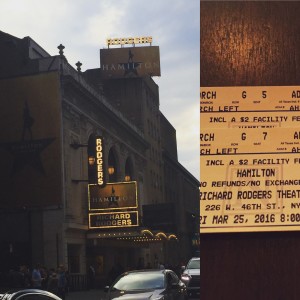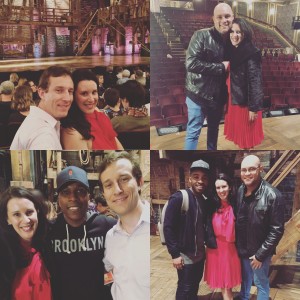Last fall I literally bought into the hype and got the Hamilton soundtrack. Predictably (as a musical theater fan, history-loving nerd, and aspiring wordsmith), I fell in love. This was not out of character. For instance, last century, I bought the Rent soundtrack and knew every word long before I ever saw it live. I can recite most every line of A Chorus Line (show and movie), Cats, Ragtime, the list goes on. I am an equal opportunity Broadway-lover, from Phantom to Drowsy Chaperone to In the Heights and Book of Mormon.
But Hamilton is different for many of the reasons others have already written about. It has more words (and I would argue they are smart, clever, and entertaining like a naughtier adult version of a Pixar movie), it has more diversity, and it has more outreach (especially to underserved high school students).
Even with all that, the underlying inequality in America today remains-- though perhaps this is merely a reflection of the world Alexander Hamilton helped to create, as demonstrated in the musical itself.
A few weeks ago I got to see the Broadway production, billed as one of the hottest tickets, well, anywhere these days. How did I do this? I made use of my social networks, calling in some social capital (from my nerdy musical theater high school days, which I hope one day I can repay). And while the coveted tickets were less expensive than the priciest tickets available (and certainly less than what you would pay a scalper), they were still a pretty penny, in addition to the cost of train tickets and a hotel room (luckily no babysitter as my in-laws stayed with the boys for a night).
Before the show, I snapped a shot of the Richard Rodgers on my phone to post to my Facebook and Instagram accounts-- as I do for most events I deem vaguely momentous (and even those less celebratory and more miserable, like the current cases of hand-foot-mouth in my household). As I got ready to post a collage of the theater pic and my tickets, I paused, struck by the idea that not only did I deploy some serious financial and social capital to make this happen, but displaying it was perhaps one of the highest (if not the highest) forms of cultural capital in my segment of America today. This digital display of something as symbolic as a ticket (merely a piece of paper) is at heart just a form of conspicuous consumption that Veblen couldn't quite have imagined, but certainly would recognize.
 Now, there's the seeing Hamilton, then there's the sharing that you have seen it. Then, when others hear/read that you have seen it another hierarchy-imposing question follows: Did you have any understudies? For which character?
Now, there's the seeing Hamilton, then there's the sharing that you have seen it. Then, when others hear/read that you have seen it another hierarchy-imposing question follows: Did you have any understudies? For which character?
In this Sunday's New York Times Magazine (oh, hello there again, cultural capital) there is an article about Hamilton's producer, Jeffrey Seller (in an odd twist turns out we are both from the suburbs of Detroit, something I will have to ponder another time). In it Michael Sokolove (another odd twist, just last week I taught another NYT Magazine piece he wrote, about Allonzo Trier, and I discuss his book, Warrior Girls: Protecting Our Daughters Against the Injury Epidemic in Women's Sports in Playing to Win) describes Seller's advertising campaign for Hamilton:
In January, Seller bought a “takeover” of Penn Station — the building’s walls and even stairways were blanketed with the black-and-gold logo for the show. It was pure iconography. Nothing about dates, how to get tickets or the names of the lead actors. Just the logo and the words “Hamilton An American Musical.” Almost no one, of course, could buy the product. Seller was paying to advertise an aspiration.
Aspirational, indeed.
Even before I read the Sokolove profile of Seller I was making Rent comparisons in my mind (not least because seated one row up from me at Hamilton was Idina Menzel, who originated the role of Maureen-- and, by the way, in terms of the hierarchy she got special in-theater treatment, with someone bringing her and her guest iced bottle of waters, natch). When Rent started its run people would sleep on the sidewalk in order to qualify for the lottery. Turns out Seller invented the rush ticket and lottery policies on Broadway.
And the lottery/rush experience is a big part of the Hamilton narrative as well. When I left the show on a Friday night around 11 pm, people were already in line to buy cancelled tickets for Saturday's shows. In this way, the cheap lottery tickets to get a *front row seat* mirrors the underlying social divisions Hamilton brings into relief. If you don't have the various forms of capital to get in, you can try your luck some other way to try to make it to the top.
At the same time though Hamilton and Rent have something else very important in common. At heart both shows are political, and they are historical. Hamilton and Rent are about young people looking to transform the world, through words and other personal creations. More people getting access to bear witness to that is a great thing, and the political messages clearly play a role in making the musicals resonate with a broader audience.
But let's not forget the display aspect as well for those who want to be in the room where it happens (self-indictment noted)...
[My only minor Hamilton criticism is that for some reason in the live version I expected some current political innuendo, like a Trump joke in a rap battle-- like one of all-time favorite and underrated Broadway musicals, The 25th Annual Putnam County Spelling Bee.]
